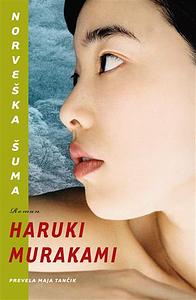You need to sign in or sign up before continuing.
Take a photo of a barcode or cover
dark
reflective
sad
medium-paced
Plot or Character Driven:
Character
Strong character development:
Complicated
Loveable characters:
Yes
Diverse cast of characters:
Yes
Flaws of characters a main focus:
Yes
emotional
reflective
sad
medium-paced
Plot or Character Driven:
Character
Strong character development:
Complicated
Loveable characters:
No
Diverse cast of characters:
Complicated
Flaws of characters a main focus:
Complicated
La novela es bastante buena; los personajes no son complejos de entender, pero la densidad de las descripciones de paisajes y estancias la hace un poco aburrida a veces. Los personajes son adultos jóvenes, entre los 19 y 21 años. El tema de la muerte de los seres queridos y la fugacidad de la vida, que en las otras novelas sólo se insinúa, se despliega aquí con una intensidad ensordecedora que contagia el estado anímico del lector. Tokio Blues no solamente narra el paso a la edad adulta, sino a la madurez que se adquiere cuando uno se enfrenta de cerca con la muerte –ya sea de un hermano o de la pareja–, con la pérdida y la imposibilidad de permanecer. La muerte, el sexo, las enfermedades y la inseguridad son elementos claves en 'Tokio Blues'. Están presentes en prácticamente todo el libro y condicionan continuamente la historia. También lo son la música y la literatura porque pese a que Murakami es un escritor japonés, siente fascinación por ciertos elementos occidentales que (por lo que he leído) introduce en casi todas sus obras. En este caso, el jazz o The Beatles (quienes ponen título al libro con "Norwegian Wood"), Truman Capote, Fitzgerald o Raymond Chandler. Tokio Blues se desarrolla a finales de los 70 con un escenario de fondo en el que reinan las revueltas estudiantiles y los extremos políticos.
dark
emotional
slow-paced
Plot or Character Driven:
Character
Strong character development:
Yes
Loveable characters:
No
Diverse cast of characters:
No
Flaws of characters a main focus:
Yes
I struggled with Norwegian Wood. While I respect the craft, I can’t say I enjoyed the experience.
I came in expecting a love story - thanks to blurbs on the back - but what I got was a slow, heavy, emotionally draining book. Murakami’s prose is beautiful and I can see why people love it but I’m not the type to linger on detailed descriptions, and the endless walking directions and name drops of Tokyo locations didn’t add much for me (though having just visited Tokyo, I admit it was fun recognizing some places).
The characters were tough to stomach. Toru, the narrator, was insufferable to me: detached, superior, and endlessly self-centered. My favorite character was actually Storm Trooper, the quirky roommate, and I was disappointed he didn’t get more of an ending. Midori, who many readers adore, grated on me with her selfishness and constant pleas for pity. Reiko left me uneasy from the start, and her role in the ending honestly disgusted me.
One theme that did resonate with me was honesty. Nagasawa (another insufferable character) prides himself on being “honest” about his selfishness, yet that honesty hurts the people around him. At the mountain sanitarium, the treatment program also elevates honesty above all else. It made me question whether this was more cult-like than healing and whether forced honesty is even healthy. That thread was interesting.
Thematically, the book is heavy on death, sex (graphic), and loneliness and by the end I was exhausted by it. The portrayal of women was especially triggering for me shallow, objectified, or written only in relation to Toru. If anything, this book feels like it invented the “manic pixie dream girl” archetype. Even the political student riots, which could have added depth, were just background noise.
This likely deserves four stars for the writing, but personally I can only give it three. There was incredibly skilled repetition and mirroring of both itself and outside sources. I really felt like I was reading the source material for many a Beatles album.
If you like melancholy, introspective character studies, this might resonate. If you do read this, I highly recommend finding a playlist to really set the vibe.
Since this is often cited as an outlier for Murakami, I’ll probably still give another one of his books a try.
I came in expecting a love story - thanks to blurbs on the back - but what I got was a slow, heavy, emotionally draining book. Murakami’s prose is beautiful and I can see why people love it but I’m not the type to linger on detailed descriptions, and the endless walking directions and name drops of Tokyo locations didn’t add much for me (though having just visited Tokyo, I admit it was fun recognizing some places).
The characters were tough to stomach. Toru, the narrator, was insufferable to me: detached, superior, and endlessly self-centered. My favorite character was actually Storm Trooper, the quirky roommate, and I was disappointed he didn’t get more of an ending. Midori, who many readers adore, grated on me with her selfishness and constant pleas for pity. Reiko left me uneasy from the start, and her role in the ending honestly disgusted me.
One theme that did resonate with me was honesty. Nagasawa (another insufferable character) prides himself on being “honest” about his selfishness, yet that honesty hurts the people around him. At the mountain sanitarium, the treatment program also elevates honesty above all else. It made me question whether this was more cult-like than healing and whether forced honesty is even healthy. That thread was interesting.
Thematically, the book is heavy on death, sex (graphic), and loneliness and by the end I was exhausted by it. The portrayal of women was especially triggering for me shallow, objectified, or written only in relation to Toru. If anything, this book feels like it invented the “manic pixie dream girl” archetype. Even the political student riots, which could have added depth, were just background noise.
This likely deserves four stars for the writing, but personally I can only give it three. There was incredibly skilled repetition and mirroring of both itself and outside sources. I really felt like I was reading the source material for many a Beatles album.
If you like melancholy, introspective character studies, this might resonate. If you do read this, I highly recommend finding a playlist to really set the vibe.
Since this is often cited as an outlier for Murakami, I’ll probably still give another one of his books a try.
dark
emotional
hopeful
reflective
sad
tense
medium-paced
emotional
funny
hopeful
inspiring
reflective
relaxing
sad
tense
medium-paced
Plot or Character Driven:
Character
Strong character development:
No
Loveable characters:
Yes
Diverse cast of characters:
N/A
Flaws of characters a main focus:
N/A
a friend told me to throw away my judgement while reading this bc there lends a special vibe to just being with the book. and I can see why now
perhaps if I’d read this in high sch I might have lost faith in men. but I have seen men who have so much genuine love to give so fk that. some parts left me in awe at how much the male gaze can revere the female body but others made me feel the way u need to scrub urself clean after an intimate act that wasn’t particularly enjoyable and felt used
also felt like a fever dream bc the acts that are happening have a certain gravity to them but somehow the writing makes u feel emotionally detached.
but part of the reason why I felt attracted to this book is probably because the vibes were reminiscent of a wong kar wai movie, peppered with wildly differing teenage experiences my sanitized Singaporean ass would never have lived through before melb. like exhaling a puff and looking through the world with a hazy lens, mind a little buzzed, and moral values be fucked. But there’s something so good and relaxing in letting the guard go for a moment and just be. and in spite of knowing it might hurt, u shrug your shoulders and go, “might as well enjoy it while im here”
but as the book comes to a close, we must address the elephants in the room. ?paedophelia, ?altar scene ?fking (calling it making love is tenuous at best) every female character basically
perhaps if I’d read this in high sch I might have lost faith in men. but I have seen men who have so much genuine love to give so fk that. some parts left me in awe at how much the male gaze can revere the female body but others made me feel the way u need to scrub urself clean after an intimate act that wasn’t particularly enjoyable and felt used
also felt like a fever dream bc the acts that are happening have a certain gravity to them but somehow the writing makes u feel emotionally detached.
but part of the reason why I felt attracted to this book is probably because the vibes were reminiscent of a wong kar wai movie, peppered with wildly differing teenage experiences my sanitized Singaporean ass would never have lived through before melb. like exhaling a puff and looking through the world with a hazy lens, mind a little buzzed, and moral values be fucked. But there’s something so good and relaxing in letting the guard go for a moment and just be. and in spite of knowing it might hurt, u shrug your shoulders and go, “might as well enjoy it while im here”
but as the book comes to a close, we must address the elephants in the room. ?paedophelia, ?altar scene ?fking (calling it making love is tenuous at best) every female character basically
emotional
reflective
relaxing
sad
medium-paced
Plot or Character Driven:
Character
Strong character development:
Yes
Loveable characters:
Complicated
Diverse cast of characters:
No
Flaws of characters a main focus:
Yes
This was my first Murakami novel. I read the German translation.
I have to say, I fully understand why this book is regarded as such a masterpiece.
Reading this felt like a dream. It was such a raw and close portrayal of the protagonist's emotions.
The atmosphere was unmatched and something really special. I haven't read a novel with this kind of atmosphere before.
The beautiful description of the Japanese landscapes paired with the monotone and at-times depressing emotions of the protagonist created an unique literary mosaic.
On a personal note, as a university student myself, I enjoyed the parts about Tōros university life a lot!
Additionally, the Beatles references (already visible in the title) were very lovely. I read this novel at the perfect time, in a sunny and rainy late summer. I've been listening to a lot of Bob Dylan lately and this novel broad me closer to the Beatles.
Norwegian Wood is a song that matched perfectly with the novel's atmosphere. Listen to the song and you will know exactly how this book feels.
I don't want to forget the serious themes. Norwegian Wood deals a lot with death. But it also has funny moments.
I think Midori and Reiko will stay with me a long time.
I don't know what I should think about Naoko. She felt a bit bland to me, if I'm being honest.
Of course, the critics aren't wrong: Murakamis description of women made me uncomfortable. I do not understand why such a cool protagonist is loved by so many women. He does nothing and they immediately obey to him.
Norwegian Wood, was after all written in the 80s. And I'm trying to see it from a different perspective. Nevertheless, I fail in doing so which is why I'm substracting ¼ star. The sexism, or whatever you wanna call it, is strong and ever lasting in this novel.
I have to say, I fully understand why this book is regarded as such a masterpiece.
Reading this felt like a dream. It was such a raw and close portrayal of the protagonist's emotions.
The atmosphere was unmatched and something really special. I haven't read a novel with this kind of atmosphere before.
The beautiful description of the Japanese landscapes paired with the monotone and at-times depressing emotions of the protagonist created an unique literary mosaic.
On a personal note, as a university student myself, I enjoyed the parts about Tōros university life a lot!
Additionally, the Beatles references (already visible in the title) were very lovely. I read this novel at the perfect time, in a sunny and rainy late summer. I've been listening to a lot of Bob Dylan lately and this novel broad me closer to the Beatles.
Norwegian Wood is a song that matched perfectly with the novel's atmosphere. Listen to the song and you will know exactly how this book feels.
I don't want to forget the serious themes. Norwegian Wood deals a lot with death. But it also has funny moments.
I think Midori and Reiko will stay with me a long time.
I don't know what I should think about Naoko. She felt a bit bland to me, if I'm being honest.
Of course, the critics aren't wrong: Murakamis description of women made me uncomfortable. I do not understand why such a cool protagonist is loved by so many women. He does nothing and they immediately obey to him.
Norwegian Wood, was after all written in the 80s. And I'm trying to see it from a different perspective. Nevertheless, I fail in doing so which is why I'm substracting ¼ star. The sexism, or whatever you wanna call it, is strong and ever lasting in this novel.
Graphic: Death, Mental illness, Panic attacks/disorders, Sexism, Sexual content, Suicidal thoughts, Suicide, Terminal illness, Toxic relationship, Death of parent
dark
hopeful
reflective
medium-paced
Plot or Character Driven:
Character
Strong character development:
Complicated
Loveable characters:
No
Diverse cast of characters:
No
Flaws of characters a main focus:
Yes
Graphic: Child abuse, Rape, Suicide
dark
emotional
reflective
sad
tense
medium-paced
Plot or Character Driven:
Character
Strong character development:
Yes
Loveable characters:
No
Diverse cast of characters:
No
Flaws of characters a main focus:
Yes



